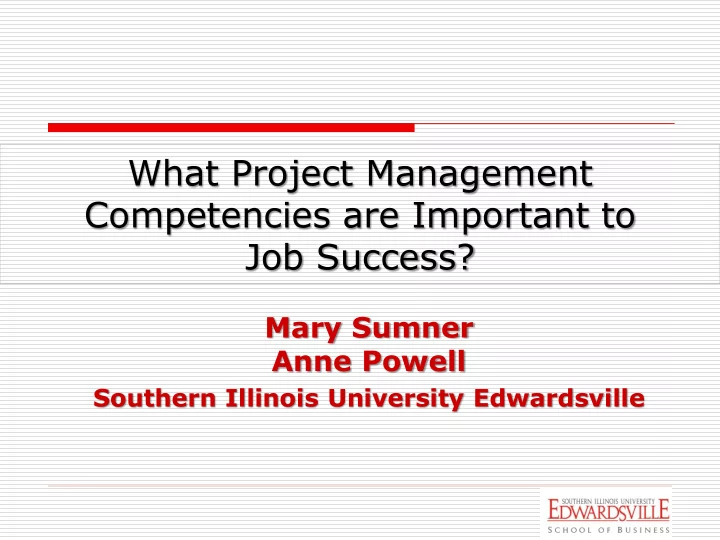

What Project Management Competencies are Important to Job Success? Mary Sumner Anne Powell Southern Illinois University Edwardsville
Literature Review Prior research focused on 3 main areas Hard Skills (Alam et al., 2010; PMBOK) Soft Skills (Stevenson & Starkweather, 2010; Smith et al., 2011; Skulmoski, 2010) Obtaining Skills (Buganza et al., 2013, Alam et al., 2010)
Motivation/Research Questions Determine PM core competencies ( both hard skills and soft skills most important to job success) Identify the current performance of PMs in organizations for identified core competencies Differentiate professional development needs for entry-level versus experienced PMs Determine emerging PM professional development needs over the next 3-5 years
Survey Development / Respondents PMBOK Project Management Advisory Board 25 experienced PM professional 48 Project Managers in attendance at one-day PM conference
Results Hard Skills Importance Performance Mean Mean Getting requirements right 4.79 3.53 Defining project scope 4.76 3.61 Collecting requirements 4.75 3.67 Effective project communications 4.72 3.57 Obtaining the buy-in of project sponsors 4.69 3.63 Managing Scope 4.66 3.37 Developing the project schedule 4.40 3.41 Managing stakeholders 4.38 3.20 Conducting stakeholder analysis 4.33 3.24 Acquiring and developing the project team 4.33 3.27 Identifying project risks 4.31 3.29 Controlling project costs 4.22 3.04
Results (continued) Soft Skills Importance Performance Soft Skills Mean Responses > 50% Mean Mean / Total responses Communication skills 4.96 3.58 In-house development 3.35 43 / 89 (48%) Leadership skills 4.76 3.58 Purchasing a package 2.63 18 / 87 (21%) Effective situational communications 4.66 3.36 Outsourcing 2.32 12 / 88 (14%) Conflict resolution skills 4.62 3.18 Application Service Provider 2.22 11 / 87 (13%) Leadership presence/confidence 4.60 3.50 Planning and organizational skills 4.50 3.80 Influencing skills 4.48 3.22 Skills for dealing with human factors 4.40 3.31 Team-building skills 4.38 3.18 Facilitation skills 4.32 3.50 Negotiating skills 4.30 3.16 Analytical and problem solving skills 4.18 3.62
PM HARD SKILLS HIGH Getting requirements right PERFORMANCE Defining project scope Collecting requirements Effective project communications Obtaining the buy-in of LOW sponsors IMPORTANCE L0W HIGH
PM SOFT SKILLS HIGH HIGH PERFORMANCE LOW IMPORTANCE PERFORMANCE Communications skills Leadership skills Effective situational LOW communications Conflict resolution skills HIGH LOW Leadership presence IMPORTANCE LOW HIGH
Results (continued) Greatest needs for Entry-Level PMs % Responding Communications 43% Basic PM – Scope, Time, Cost 30% PMI Certification 11% Stakeholder management 11% Understanding the company culture and PM 11% practices Estimating 11%
Results (continued) Greatest needs for experienced PM % Responding Communications 18% Leadership 15% Managing budgets 13% Negotiation/Influencing 13% Risk Management 13% Conflict Resolution 11% Team-Building 11%
Results (continued) Emerging PM Needs over next 3-5 years % Responding Communications 39% Leadership 17% Agile Development skills 14% Virtual Team management 14% Basic PM – Scope, Time, Cost 14% Risk Management 11% PMO Role 11%
Where to go next? Further analysis and interpretation of results Hard/Soft skills Entry level versus Experienced Projected PM Skill Sets Suggestions for PM Education
Thank you! We appreciate your attendance today and any feedback you might provide.
Recommend
More recommend